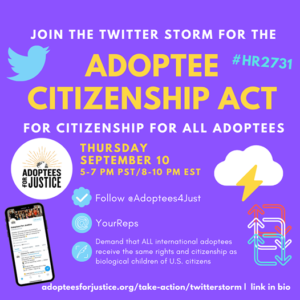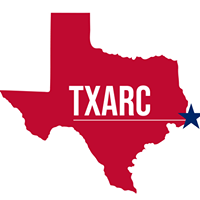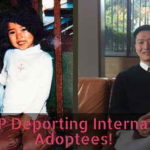You can help stop this attack on adoptees and our rights by supporting the tweetstorm. It will only take a few minutes of your time
Justice for Adoptees, a leader in citizenship rights for adoptees, has a page set up specifically for tonight’s event that explains what it is and how you can participate—and a terrific twitterstorm toolkit to help you do it.
_________________
Currently, H.R. 2731/S.1554 (ACA 2019-2020) are running in both houses. These are the latest set of federal bills before lawmakers to amend the Adoptee Citizenship Act of 2000, a compromise law that extended automatic citizenship to those adopted cross-country to the US on or after February 27, 1983, Those born before that date are left behind subject to Draconian investigations and potential deportation. to their countries of origin. Similar amendments have been introduced since 2016 and died without hearings–a clear message that adoptees don’t count.
HR 2731, sponsored by Rep. Adam Smith (D-WA) was introduced in May 2019. It has 61 co-sponsors, and; is now in the House Subcommittee on Immigration and Border Security. 15 members of the Subcommittee must prioritize the bill and move it forward. No hearings are scheduled–Time is running out.
Read Bastard Nation’s History, Analysis, & Endorsement of Adoptee Citizenship Act, 2019-2020
Until 2000 children adopted internationally by US citizens were required to undergo a naturalization process prescribed by US law. Depending on the type of visa the child traveled under to enter the US, some were granted automatic citizenship while others gained citizenship only after their adoptive parents “re-adopted” them in the US following procedures outlined by federal and individual state law.
Unfortunately, many adoptive parents did not research or verify citizenship status at the time of adoption or follow through on the citizenship process. Some say they were unaware of naturalization requirements and believed citizenship was automatic upon adoption finalization. Some claim to have been misled about citizenship procedures by their adoption agencies, courts, lawyers, or federal immigration authorities. Some believed that it was up to the adoptee, at the age of majority, to choose their citizenship status. In some cases adoptive parents disrupted the adoption, and either “rehomed” the children they brought to the US or turned them over to the state foster care system where they lingered with no legal closure.
Decades later these misunderstandings and failures led to legal problems—including deportation proceedings– for international adoptees years after their adoptions were assumed “finalized” and citizenship granted. Most of these adoptees had no idea that they were not US citizens until they attempted something as simple as registering to vote or were convicted of minor crimes—even misdemeanors—and fell under the gaze of government authorities.
Citizenship for Adoptees is vital in the pursuit of human and civil rights for all adoptees. We won’t have rights until all of us have our rights.
Twitterstorm Page
Twitterstorm Toolkit
Selected Resources




 New York Adoptee Rights Coalition
New York Adoptee Rights Coalition











